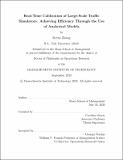Real-Time Calibration of Large-Scale Traffic Simulators: Achieving Efficiency Through the Use of Analytical Mode
Author(s)
Zhang, Kevin,M. Eng.Massachusetts Institute of Technology.
Download1227096827-MIT.pdf (3.628Mb)
Other Contributors
Massachusetts Institute of Technology. Operations Research Center.
Advisor
Carolina Osorio.
Terms of use
Metadata
Show full item recordAbstract
Stochastic traffic simulators are widely used in the transportation community to model real-world urban road networks in applications ranging from real-time congestion routing and control to traffic state prediction. Online calibration of these simulators plays a crucial role in achieving high accuracy in the replication and prediction of streaming traffic data (i.e., link flows, densities). In order to be relevant in a real-time context, the problem must also be solved within a strict computational budget. The primary goal of this thesis is to develop an algorithm that adequately solves the online calibration problem for high-dimensional cases and on large-scale networks. In the first half, a new online calibration algorithm is proposed that incorporates structural information from an analytical metamodel into a general-purpose extended Kalman filter framework. The metamodel is built around a macroscopic network model that relates calibration parameters to field measurements in an analytical, computationally tractable, and differentiable way. Using the metamodel as an analytical approximation of the traffic simulator improves the computational efficiency of the linearization step of the extended Kalman filter, making it suitable for use in large-scale calibration problems. The embedded analytical network model provides a secondary benefit of making the algorithm more robust to simulator stochasticity compared with traditional black-box calibration methods. In the second half, the proposed algorithm is adapted for the case study of online calibration of travel demand as defined by a set of time-dependent origin-destination matrices. First, an analytical network model relating origin-destination demand to link measurements is formulated and validated on the Singapore expressway network. Next, the proposed algorithm is validated on a synthetic toy network, where its flexibility in calibrating to multiple sources of field data is demonstrated. The empirical results show marked improvement over the baseline of offline calibration and comparable performance to multiple benchmark algorithms from the literature. Finally, the proposed algorithm is applied to a problem of dimension 4,050 on the Singapore expressway network to evaluate its feasibility for large-scale problems. Empirical results confirm the real-time performance of the algorithm in a real-world setting, with strong accuracy in the estimation of sensor counts.
Description
Thesis: Ph. D., Massachusetts Institute of Technology, Sloan School of Management, Operations Research Center, September, 2020 Cataloged from PDF version of thesis. Includes bibliographical references (pages 197-203).
Date issued
2020Department
Massachusetts Institute of Technology. Operations Research Center; Sloan School of ManagementPublisher
Massachusetts Institute of Technology
Keywords
Operations Research Center.